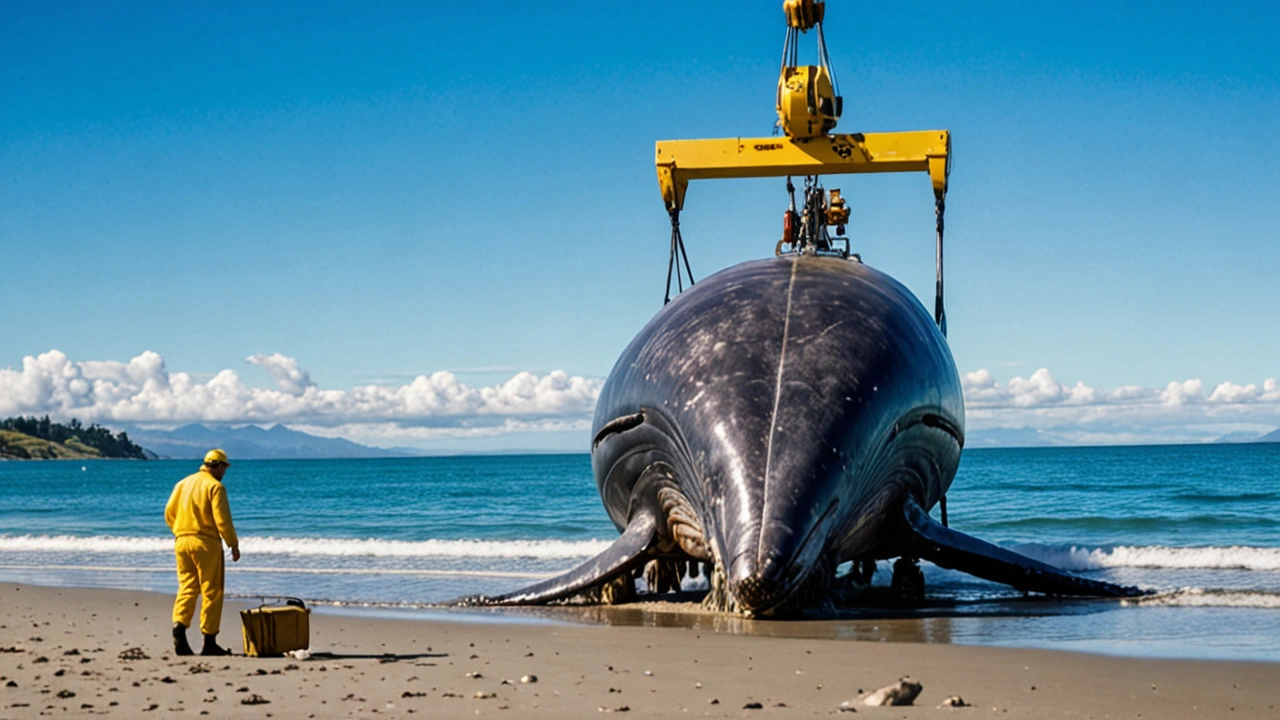Discovery of a Rare Marine Creature
The beach of New Zealand's South Island has revealed an extraordinary find—a rare species of whale that has long eluded science. This spade-toothed whale, identified as a male by its unique coloration and anatomical features, has washed ashore, offering researchers a rare opportunity to study one of the world's most mysterious marine creatures. Its five-meter frame, although a tragic sight, has become a beacon of excitement and curiosity for scientists and local communities alike.
Identifying the Spade-Toothed Whale
The New Zealand coastline is renowned for its frequent whale strandings, and the recent discovery of the spade-toothed whale adds to this pattern. Recognizable by its color patterns and the distinct shape of its skull, beak, and teeth, this whale represents one of only six documented examples of the species found globally. Long considered the rarest of all whale species, the spade-toothed whale remains largely a mystery to marine biologists.
An Unprecedented Opportunity for Research
Previous encounters with this elusive species often ended in frustration, as specimens were typically in a state that made DNA testing and detailed study impossible. This recent find, however, has provided a unique opportunity—this specimen is intact and suitable for thorough scientific examination. The Department of Conservation (DOC) has teamed up with local Māori iwi (tribes) to perform detailed genetic testing, which may take several months to complete. This research could unveil invaluable information regarding the species' habitat, diet, and behavioral patterns.
A Deep-Diving Enigma
Historically, the spade-toothed whale has evaded scientific understanding primarily because of its deep-diving nature and infrequent appearances at the ocean’s surface. These whales are adept at diving to extreme depths in search of food, making encounters with humans exceedingly rare. Researchers are hopeful that this latest discovery will shed light on the whale's elusive lifestyle and deep-sea habits, contributing significantly to our understanding of marine biodiversity.
Conservation and Cultural Importance
For the local Māori people, whales hold a sacred place as taonga, or treasured entities. This spiritual and cultural reverence adds additional significance to the conservation efforts surrounding these marine animals. New Zealand has witnessed over 5,000 recorded whale strandings since 1840, making it imperative that each event is treated with care and scientific rigor.
The Broader Implications
The discovery of the spade-toothed whale not only excites marine biologists but also underscores the importance of ongoing conservation work. As climate change and human activities continue to impact marine ecosystems, understanding the delicate balance of these environments becomes ever more critical. The collaboration between the DOC and Māori iwi highlights the importance of combining traditional knowledge with modern science to protect and understand our world.
Future Prospects
As genetic testing and further studies progress, the world awaits with bated breath for the insights that will be drawn from this rare and significant find. Each piece of data gathered will contribute to a broader understanding of the spade-toothed whale's role in the marine ecosystem, potentially guiding future conservation strategies. While the journey to uncover the secrets of this mysterious creature is just beginning, the collaboration and dedication of scientists and local communities stand as a testament to the enduring human spirit of discovery and protection of the natural world.







Saachi Sharma July 17, 2024
Wow. Just... wow. This is the kind of thing that makes you remember nature doesn't care about our timelines.
Vijayan Jacob July 17, 2024
Ah yes, another whale washes up in NZ. Next they'll find a dolphin wearing a top hat and singing opera. Honestly, how many of these 'rare' species are just poorly photographed dolphins?
Kaviya A July 18, 2024
i mean like... why do whales keep dying on beaches?? its so sad like i cried when i saw the pic lol
Supreet Grover July 18, 2024
The trophic cascade implications of this specimen’s morphometric divergence from known Odontocete clades are non-trivial. We're looking at potential niche partitioning anomalies in the bathypelagic zone, which could recalibrate our models of deep-sea cetacean foraging ecology.
Saurabh Jain July 18, 2024
It's beautiful how science and tradition are working together here. Māori knowledge has always understood the ocean in ways modern science is only catching up to. This is how it should be done.
Suman Sourav Prasad July 19, 2024
I mean, I'm not saying we should stop studying them, but... like... why does it always have to be a dead whale? Can't we just, I don't know, follow them with drones? Or use sonar? Or... something less tragic?
Nupur Anand July 19, 2024
Let’s be real-this isn’t ‘science.’ This is colonial science. Western institutions swoop in, take the corpse, run DNA tests, publish papers, and then call it ‘discovery.’ Meanwhile, the Māori have known about this whale for generations. They didn’t need a dead body to validate its existence. The real tragedy isn’t the whale-it’s that we still need corpses to believe in indigenous knowledge.
Vivek Pujari July 19, 2024
This is why we need more funding for AI-driven marine surveillance. If we had real-time deep-sea monitoring, we could’ve tracked this whale before it stranded. Also, climate change is obviously the culprit. We need to ban plastic and carbon immediately. 🌍🔥
Ajay baindara July 20, 2024
You people act like this is the first time a whale died. Newsflash: they die all the time. And you still think this is some mystical event? Wake up.
mohd Fidz09 July 20, 2024
This is what happens when you let the West control the narrative. In India, we have whales in our ancient texts-Vishnu’s Matsya avatar, for example. This spade-toothed whale? It’s not rare. It’s been here all along. We just didn’t need a dead body to prove it. NZ is just good at PR.
Rupesh Nandha July 20, 2024
It’s fascinating how this discovery forces us to confront the limits of our observation. We’ve mapped the moon’s surface in detail, yet we know less about the deep ocean than we do about Mars. This whale isn’t just a specimen-it’s a mirror. What does it say about us that we only notice something when it’s dead? And why do we assume that to understand something, we must dissect it?
suraj rangankar July 21, 2024
This is why we need to keep pushing for ocean conservation! Every single one of these discoveries is a wake-up call! We can’t give up! We’ve got to act NOW! The ocean is screaming, and we’re the only ones who can hear it! Let’s go out there and make a difference!
Nadeem Ahmad July 21, 2024
Huh. Interesting. I wonder what it was doing so far from its usual range.
Yash Tiwari July 22, 2024
The notion that this whale’s stranding constitutes a ‘breakthrough’ is fundamentally flawed. The entire framework of marine biology is predicated on opportunistic necropsies-this is not science, it’s salvage anthropology. We are not studying a living ecosystem; we are conducting postmortem ethnography on a species we have systematically rendered invisible through industrial noise, overfishing, and climate disruption. The fact that we celebrate this as progress reveals the moral bankruptcy of our epistemological framework.
Mansi Arora July 23, 2024
they said it was rare but like... its just a whale right? why are we acting like its the holy grail of sea creatures? also the spelling on the article is weird like 'spade-toothed' why not 'spade toothed'???
Amit Mitra July 23, 2024
I’ve spent years studying whale strandings in the Indian Ocean, and I’ve never seen anything like this. The spade-toothed whale’s migration patterns, if they exist, are likely tied to hydrothermal vent systems we haven’t mapped yet. The fact that this specimen was found intact suggests it may have been disoriented by underwater sonar or seismic surveys. The Māori oral histories mention ‘deep singers that vanish when the earth trembles’-could this be a cultural echo of anthropogenic disturbance?
sneha arora July 24, 2024
this makes me so happy that people are caring 🥹🙏 maybe we can still save the ocean if we work together 💙
Sagar Solanki July 25, 2024
Let me guess-this whale was genetically modified by the UN to test bio-surveillance tech. The ‘spade-toothed’ name? A cover. The real teeth are quantum sensors. They’re using whale strandings as data collection points. The DOC? A front. The Māori? Complicit. You think this is science? It’s a cover for deep-ocean mind control. The real mystery isn’t the whale-it’s why no one’s asking who funded this ‘research’.
Rick Morrison July 26, 2024
The collaboration between DOC and Māori iwi is genuinely encouraging. It’s rare to see Western scientific institutions defer to Indigenous knowledge systems with such humility. The genetic data may take months, but the cultural framework guiding this effort-respect, reciprocity, and responsibility-is already yielding results. We need more of this model globally, not just for whales, but for every ecosystem we claim to protect.
shubham pawar July 26, 2024
You know what’s really tragic? That we’re all crying over one dead whale while the ocean is being turned into a plastic soup. This whale’s death is a headline. The death of 100,000 marine animals every day? That’s just background noise. We don’t mourn the system that kills them-we just wait for the next rare animal to die so we can feel morally superior.